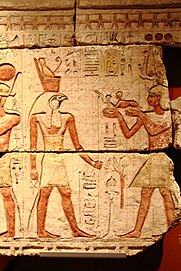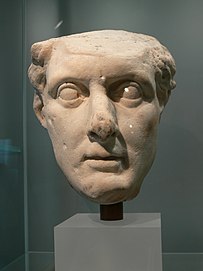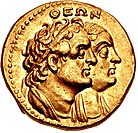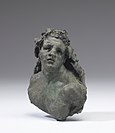Ptolemy I Soter
| Ptolemy I Soter | |
|---|---|
 Bust of Ptolemy I, located at theLouvre. | |
| Pharaoh | |
Kingof thePtolemaic Kingdom | |
| Reign | 305 – January 282 BC |
| Predecessor | Alexander IV |
| Successor | Ptolemy II Philadelphus |
| Consorts | |
| Children | (at least 12)
|
| Father | Lagus |
| Mother | Arsinoe of Macedon |
| Born | c. 367 BC Eordaea,Macedon,Greece |
| Died | January 282 BC (aged 84–85) Alexandria,Ptolemaic Kingdom |
| Dynasty | Ptolemaic dynasty |
Ptolemy I Soter(/ˈtɒləmi/;Greek:Πτολεμαῖος Σωτήρ,Ptolemaîos Sōtḗr"Ptolemythe Savior";c. 367 BC – January 282 BC) was aMacedonian Greek[2]general, historian, andsuccessorofAlexander the Greatwho went on to found thePtolemaic Kingdomcentered onEgypt.Ptolemy wasbasileusandpharaohofPtolemaic Egyptfrom 305/304 BC to his death in 282 BC,[3]andhis descendantscontinued to rule Egypt until 30 BC. During their rule, Egypt became a thriving bastion ofHellenisticcivilization andAlexandriaa great seat ofGreek culture.
Ptolemy I was the son ofArsinoe of Macedonby either her husbandLagusorPhilip II of Macedon,the father of Alexander. However, the latter is unlikely and may be a myth fabricated to glorify thePtolemaic Dynasty.[4]Ptolemy was one of Alexander's most trusted companions and military officers. After thedeath of Alexanderin 323 BC, Ptolemy retrieved his body as it was en route to be buried in Macedon, placing it inMemphisinstead, where it was later moved to Alexandria in a newtomb.Afterwards he joined a coalition againstPerdiccas,the royal regent overPhilip III of Macedon.The latter invaded Egypt but was assassinated by his own officers in 320 BC, allowing Ptolemy I to consolidate his control over the country. After aseries of wars between Alexander's successors,Ptolemy gained a claim toJudeain southernSyria,which was disputed with the Seleucid kingSeleucus I.He also took control ofCyprusandCyrenaica,the latter of which was placed under the control of Ptolemy's stepsonMagas.Ptolemy also commanded the construction of theLibrary of Alexandriaand of theLighthouse of Alexandria,one of theSeven Wonders of the Ancient World.
Ptolemy I may have marriedThaïs,his mistress during the life of Alexander; he is known to have married the Persian noblewomanArtakamaon Alexander's orders. He later marriedEurydice,daughter of the Macedonian regentAntipater;their sonsPtolemy KeraunosandMeleagerruled in turn as kings of Macedon. Ptolemy's final marriage was to Eurydice's cousin and lady-in-waiting,Berenice I.Upon his death, he was succeeded by his son with Berenice,Ptolemy II.
Early life and career
[edit]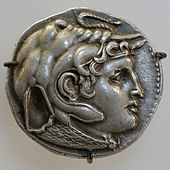
Ptolemy was born in 367 BC[5]in the ancient kingdom ofMacedon.[2]His mother wasArsinoe.According toSatyrus the Peripatetic,Arsinoe was a descendant ofAlexander I of Macedonand thus a member of theArgead dynasty,claiming ultimate descent fromHeracles.Ostensibly, Ptolemy's father wasLagus,a Macedonian nobleman fromEordaea,but many ancient sources claim that he was actually an illegitimate son ofPhilip II of Macedon.If true, this would have made Ptolemy the half-brother ofAlexander the Great.It is probable that this is a later myth fabricated to glorify the Ptolemaic dynasty.[6]However, through his mother Ptolemy may have been a great-grandson ofAmyntas I of Macedon,making him a member of the Argead royal house and a distant relative of Alexander, who was a great-great-grandson of Amyntas.[7][8]
Ptolemy served with Alexander from his first campaigns, and was among the sevensomatophylakes(bodyguards) of Alexander. He played a principal part in the later campaigns inAfghanistanandIndia.[9]He participated in theBattle of Issus,commanding troops on the left wing under the authority of Parmenion. Later he accompanied Alexander during his journey to theOraclein theSiwa Oasiswhere he was proclaimed a son ofZeus.[10]Ptolemy had his first independent command during the campaign against the rebelBessuswhom his own guards captured and handed over to Ptolemy, who then handed him over to Alexander for execution.[11]
Successor of Alexander
[edit]When Alexander died in 323 BC, Ptolemy is said to have instigated the settlement of the empire made atBabylon.Through thePartition of Babylon,he was appointedsatrapofEgypt,under the nominal kingsPhilip IIIand the infantAlexander IV;the former satrap, the GreekCleomenes,stayed on as his deputy. Ptolemy quickly moved, without authorization, to subjugateCyrenaica.[9]
By custom, kings in Macedonia asserted their right to the throne by burying their predecessor. Probably because he wanted to pre-emptPerdiccas,the imperial regent, from staking his claim in this way, Ptolemy took great pains in acquiring the body of Alexander the Great.On his deathbed,Alexander wished to be buried at the Temple ofZeus Ammonin theSiwa Oasisofancient Libyainstead of the royal tombs ofAigaiin Macedon.[12]However, his successors including Perdiccas attempted to bury his body in Macedon instead. In late 322 or early 321 BC, Alexander's body was in Syria, on its way to Macedon, when it was captured by Ptolemy I. He brought Alexander's remains back to Egypt, interring them atMemphis,but they were later moved to Alexandria where atombwas constructed for them.[13]Shortly after this event, Ptolemy openly joined the coalition against Perdiccas. Perdiccas appears to have suspected Ptolemy of aiming for the throne himself, and may have decided that Ptolemy was his most dangerous rival. Ptolemy executed Cleomenes for spying on behalf of Perdiccas; this removed the chief check on his authority, and allowed Ptolemy to obtain the huge sum that Cleomenes had accumulated.[14]
Rivalry and wars
[edit]
Other:CarthageRomeGreek colonies
In 321 BC, Perdiccas attempted to invade Egypt, only to fall at the hands of his own men.[15]Ptolemy's decision to defend theNileagainst Perdiccas ended in fiasco for Perdiccas, with the loss of 2,000 men. This failure was a fatal blow to Perdiccas' reputation, and he was murdered in his tent by two of his subordinates. Ptolemy immediately crossed the Nile, to provide supplies to what had the day before been an enemy army. Ptolemy was offered the regency in place of Perdiccas, but he declined.[16]Ptolemy was consistent in his policy of securing a power base, while never succumbing to the temptation of risking all to succeed Alexander.[17]
In the long wars that followed between the differentDiadochi,Ptolemy's first goal was to hold Egypt securely, and his second was to secure control in the outlying areas: Cyrenaica andCyprus,as well asSyria,including the province ofJudea.His first occupation of Syria was in 318, and he established at the same time a protectorate over the petty kings of Cyprus. WhenAntigonus I,master of Asia in 315, showed expansionist ambitions, Ptolemy joined the coalition against him, and on the outbreak of war, evacuated Syria. In Cyprus, he fought the partisans of Antigonus, and re-conquered the island (313). A revolt inCyrenewas crushed the same year.[9]
In 312, Ptolemy andSeleucus,the fugitive satrap of Babylonia, both invaded Syria, and defeatedDemetrius I,the son of Antigonus, in theBattle of Gaza.Again he occupied Syria, and again—after only a few months, when Demetrius had won a battle over his general, and Antigonus enteredSyriain force—he evacuated it. In 311, a peace was concluded between the combatants. Soon after this, the surviving 13-year-old king, Alexander IV, was murdered in Macedonia on the orders of Cassander, leaving the satrap of Egypt absolutely his own master.[9]
The peace did not last long, early in 310 he was informed that his allyNicocles of Paphoswas planning to defect to Antigonus; he sent some agents, who together with his brotherMenelaus,who was still on Cyprus with an army, dealt with the situation, they surrounded Nicocles palace and forced him to commit suicide.[18]In 309 Ptolemy personally commanded a fleet which detached the coastal towns ofPhaselis,Xanthos,Kaunos,IasosandMyndusinLyciaandCariafrom Antigonus, then crossed into Greece, where he took possession ofCorinth,SicyonandMegara(308 BC). In 306, a great fleet under Demetrius attacked Cyprus, and Ptolemy's brotherMenelauswas defeated and captured in another decisiveBattle of Salamis.Ptolemy's complete loss of Cyprus followed.[9]
The satraps Antigonus and Demetrius now each assumed the title of king; Ptolemy, as well asCassander,LysimachusandSeleucus I Nicator,responded by doing the same. In the winter of 306 BC, Antigonus tried to follow up his victory in Cyprus by invading Egypt; but Ptolemy was strongest there, and successfully held the frontier against him. Ptolemy led no further overseas expeditions against Antigonus.[19]However, he did send great assistance toRhodeswhen it wasbesieged by Demetrius (305/304).The Rhodians granted divine honors to Ptolemy as a result of the lifting of the siege.[20]
When the coalition against Antigonus was renewed in 302, Ptolemy joined it, and invaded Syria a third time, while Antigonus was engaged with Lysimachus inAsia Minor.On hearing a report that Antigonus had won a decisive victory there, he once again evacuated Syria. But when the news came that Antigonus had been defeated and slain by Lysimachus and Seleucus at theBattle of Ipsusin 301, he occupied Syria a fourth time.[19]
The other members of the coalition had assigned all Syria to Seleucus, after what they regarded as Ptolemy's desertion, and for the next hundred years, the question of the ownership of southern Syria (i.e., Judea) produced recurring warfare between theSeleucidand Ptolemaic dynasties. Henceforth, Ptolemy seems to have involved himself as little as possible in the rivalries betweenAsia MinorandGreece;he lost what he held in Greece, but reconquered Cyprus in 295/294.Cyrenaica,after a series of rebellions, was finally subjugated in about 300 and placed under his stepsonMagas.[19]
Marriages, children, and succession
[edit]While Alexander was alive, Ptolemy had three children with his mistressThaïs,who may also have been his wife: Lagus; Leontiscus; and Eirene, who was given in marriage to Eunostos of Soloi in Cyprus. During theSusa weddings,Ptolemy married Persian noblewomanArtakama,as ordered by Alexander the Great.[21]Around322 BC,he marriedEurydice,daughter ofAntipater,regent of Macedonia. They had five children before she was repudiated: three sons–Ptolemy Ceraunus,king ofMacedonfrom281 BCto279 BC;his brother and successorMeleager,who ruled for two months in 279 BC; and a 'rebel in Cyprus' who was put to death by his half-brotherPtolemy II–as well as the daughters Ptolemais, who marriedDemetrius I of Macedon,andLysandra,first married toAlexander V of Macedonand after to Lysimachus' sonAgathocles.[21][22][23][24][25][26]Ptolemy married once more toBerenice,Eurydice's cousin, who had come to Egypt as Eurydice's lady-in-waiting with the children from her first marriage toPhilip.Their children wereArsinoe II,Philotera,and Ptolemy II. Their eldest child Arsinoe married Lysimachus, then her half-brother Ptolemy Keraunos, and finally her full brother Ptolemy II.[22][27]
In 285, Ptolemy made his son Ptolemy II his co-regent. His eldest legitimate son, Ptolemy Keraunos, fled to the court of Lysimachus. Ptolemy I died in January 282 aged 84 or 85.[5]Shrewd and cautious, he had a compact and well-ordered realm to show at the end of forty years of war. His reputation for good nature and liberality attached the floating soldier-class of Macedonians and other Greeks to his service, and was not insignificant; nor did he wholly neglect conciliation of the natives. He was a ready patron of letters, founding the GreatLibrary of Alexandria.[28]ThePtolemaic dynastywhich he founded ruled Egypt for nearly three hundred years. It was aHellenistickingdom known for its capital Alexandria, which became a center ofGreek culture.Ptolemaic rule ended with thedeathofCleopatra VIIin 30 BC.[29]
Historian
[edit]Ptolemy himself wrote an eyewitness history of Alexander's campaigns (now lost).[30]In the second century AD, Ptolemy's history was used byArrianof Nicomedia as one of his two main primary sources (alongside the history ofAristobulus of Cassandreia) for his own extantAnabasisof Alexander, and hence large parts of Ptolemy's history can be assumed to survive in paraphrase or précis in Arrian's work.[31]Arrian cites Ptolemy by name on only a few occasions, but it is likely that large stretches of Arrian'sAnabasisreflect Ptolemy's version of events. Arrian once names Ptolemy as the author "whom I chiefly follow",[32]and in his Preface writes that Ptolemy seemed to him to be a particularly trustworthy source, "not only because he was present with Alexander on campaign, but also because he was himself a king, and hence lying would be more dishonourable for him than for anyone else".[33]
Ptolemy's lost history was long considered an objective work, distinguished by its straightforward honesty and sobriety,[19]but more recent work has called this assessment into question. R. M. Errington argued that Ptolemy's history was characterised by persistent bias and self-aggrandisement, and by systematic blackening of the reputation ofPerdiccas,one of Ptolemy's chief dynastic rivals after Alexander's death.[34]For example, Arrian's account of the fall ofThebesin 335 BC (Anabasis1.8.1–1.8.8,a rare section of narrative explicitly attributed to Ptolemy by Arrian) shows several significant variations from the parallel account preserved inDiodorus Siculus(17.11–12), most notably in attributing a distinctly unheroic role in proceedings to Perdiccas. More recently, J. Roisman has argued that the case for Ptolemy's blackening of Perdiccas and others has been much exaggerated.[35]
Euclid
[edit]Ptolemy personally sponsored the greatmathematicianEuclid.He found Euclid's seminal work, theElements,too difficult to study, so he asked if there were an easier way to master it. According toProclus,Euclid famously quipped: "Sire, there is noRoyal Roadtogeometry."[36]
In art and fiction
[edit]- Ptolemy is portrayed byAnthony HopkinsandElliot Cowanas the narrator and a main character in the historical epicAlexander,directed byOliver Stone.
- Ptolemy appears as a minor character inMary Renault'sAlexander Trilogynovels.
- Ptolemy appears as a character in the mobile gameFate Grand Orderas an Archer Class Servant.
- Ptolemy is portrayed by Dino Kelly as a recurring character in Netflix's 2024 drama docuseriesAlexander: The Making of a God.
See also
[edit]- History of Ptolemaic Egypt
- Serapis,Greco-Egyptian god, promoted by Ptolemy
References
[edit]Citations
[edit]- ^abcdLeprohon 2013,p. 178.
- ^abJones, Prudence J. (2006).Cleopatra: A Sourcebook.Norman: University of Oklahoma Press. p.14.ISBN9780806137414.
They were members of the Ptolemaic dynasty of Macedonian Greeks, who ruled Egypt after the death of its conqueror, Alexander the Great.
- ^Hölbl, Günther (2013).A History of the Ptolemaic Empire.Routledge. p. 21.ISBN9781135119836.
- ^Alexandre le Grand.Librairie Droz. 1962. p. 155.ISBN978-2-600-04414-1.
- ^abPtolemy I at Livius.org
- ^Carney, Elizabeth (2010).Philip II and Alexander The Great: Father and Son, Lives and Afterlives.New York: Oxford University Press.ISBN978-0-19-973815-1.
- ^Alexander The Great: Myth, Genesis and Sexuality by Daniel Ogden 2011 P. 81 note 8
- ^https://pothos.org/forum/viewtopic.php?p=47694#p47694[bare URL]
- ^abcdeChisholm 1911,p. 616.
- ^Grimal, Nicolas(1992).A History of Ancient Egypt.Oxford: Blackwell Books. p.382.ISBN978-0-631-19396-8.
- ^Arrian(1976).de Sélincourt, Aubrey(ed.).Anabasis Alexandri (The Campaigns of Alexander).Harmondsworth:Penguin Books.III, 30.ISBN978-0-14-044253-3.
- ^Lauren O'Connor (2008)."The Remains of Alexander the Great: The God, The King, The Symbol".Constructing the Past.Retrieved28 March2019..
- ^Saunders, Nicholas (2007),Alexander's Tomb: The Two-Thousand Year Obsession to Find the Lost Conqueror,Basic Books, p. 41,ISBN978-0465006212
- ^Green, Peter (1990).Alexander to Actium.University of California Press. pp 13–14.ISBN9780520083493.
- ^Anson, Edward M (Summer 1986). "Diodorus and the Date of Triparadeisus".The American Journal of Philology(The Johns Hopkins University Press) 107 (2): 208–217.doi:10.2307/294603.JSTOR294603.
- ^Peter Green p14
- ^Peter Green pp 119
- ^Billows 1990,p. 143.
- ^abcdChisholm 1911,p. 617.
- ^Siege of Rhodes at Livius.org
- ^abOgden, Daniel (1999).Polygamy Prostitutes and Death. The Hellenistic Dynasties.London: Gerald Duckworth & Co. Ltd. p. 150.ISBN07156-29301.
- ^abClayman, Dee L. (2014).Berenice II and the Golden Age of Ptolemaic Egypt.Oxford University Press. p. 65.ISBN9780195370881.
- ^Macurdy, Grace Harriet (1985).Hellenistic Queens(Reprint of 1932 ed.). Chicago: Ares Publishers.ISBN978-0-89005-542-7.
- ^Hölbl, Gūnther (2001).A History of the Ptolemaic Empire.Routledge. pp.35–36.ISBN978-0-06-019439-0.
- ^McKechnie, Paul; Guillaume, Philippe (16 October 2008).Ptolemy II Philadelphus and his World.Brill. p. 43.ISBN978-9047424208.
- ^Plutarch,Parallel Lives,"Demetrius",32,46
- ^"Berenice I at Livius.org".Archived fromthe originalon 2016-03-17.Retrieved2020-03-26.
- ^Phillips, Heather A.,"The Great Library of Alexandria?". Library Philosophy and Practice, August 2010Archived2012-04-18 at theWayback Machine
- ^Ptolemaic Dynasty at World History Encyclopedia
- ^Jacoby, Felix (1926).Die Fragmente der griechischen Historiker, Teil 2, Zeitgeschichte. – B. Spezialgeschichten, Autobiographien und Memoiren, Zeittafeln [Nr. 106-261].Berlin: Weidmann. pp. 752–769, no. 138, "Ptolemaios Lagu".OCLC769308142.
- ^Bosworth, A. B. (1988).From Arrian to Alexander: Studies in Historical Interpretation.Oxford: Oxford University Press. pp. 13–14.ISBN978-0198148630.
- ^Anabasis6.2.4
- ^Anabasis,Prologue
- ^Errington, R. M. (1969-01-01). "Bias in Ptolemy's History of Alexander".The Classical Quarterly.19(2): 233–242.doi:10.1017/S0009838800024642.JSTOR637545.S2CID170128227.
- ^Roisman, Joseph (1984-01-01). "Ptolemy and His Rivals in His History of Alexander".The Classical Quarterly.34(2): 373–385.doi:10.1017/S0009838800031001.JSTOR638295.S2CID163042651.
- ^Robinson, Victor (2005).The Story of Medicine.Whitefish, Montana: Kessinger Publishing. p. 80.ISBN978-1-4191-5431-7.
Sources
[edit]- Anson, Edward M. (15 June 2023).Ptolemy I Soter: Themes and Issues.Bloomsbury Publishing.ISBN978-1-350-26082-5.
- Caroli, Christian A. (2007).Ptolemaios I. Soter: Herrscher zweier Kulturen.Konstanz: Badawi - Artes Afro Arabica.ISBN9783938828052.
- This article incorporates text from a publication now in thepublic domain:Chisholm, Hugh,ed. (1911). "Ptolemies".Encyclopædia Britannica.Vol. 22 (11th ed.). Cambridge University Press. pp. 616–618.
- Ellis, Walter M. (1994).Ptolemy of Egypt.London: Routledge.ISBN9780415100205.
- Leprohon, Ronald J. (2013).The Great Name: Ancient Egyptian Royal Titulary.SBL Press.ISBN978-1-58983-736-2.Retrieved4 January2024.
- McKechnie, Paul R.; Cromwell, Jennifer (2018).Ptolemy I and the Transformation of Egypt, 404-282 BCE.Leiden: Brill.ISBN978-90-04-36696-1.
- Waterfield, Robin (2011).Dividing the Spoils – The War for Alexander the Great's Empire(hardback). New York: Oxford University Press.ISBN978-0-19-957392-9.
- Billows, Richard A. (1990).Antigonos the One-Eyed and the Creation of the Hellenistic State.Berkeley, Los Angeles, London: University of California Press.ISBN0-520-20880-3.
External links
[edit]- Ptolemy Soter I at LacusCurtius— (Chapter II of E. R Bevan'sHouse of Ptolemy,1923)
- Ptolemy I(at Egyptian Royal Genealogy, with genealogical table)
- Livius,Ptolemy I SoterArchived2016-03-03 at theWayback Machineby Jona Lendering
- Ptolemy I Soterentry in historical sourcebook by Mahlon H. Smith
- A genealogical tree of Ptolemy, though not necessarily reliableAlexander the Great
- Ptolemy I Soter
- 360s BC births
- 280s BC deaths
- 4th-century BC pharaohs
- 3rd-century BC pharaohs
- Pharaohs of the Ptolemaic dynasty
- Ancient Macedonian historians
- Ancient Eordaeans
- Hetairoi
- Historians who accompanied Alexander the Great
- Satraps of the Alexandrian Empire
- Somatophylakes
- Trierarchs of Nearchus' fleet
- 3rd-century BC Greek people
- 4th-century BC Macedonians
- 3rd-century BC Macedonians
- 3rd-century BC historians
- Argead dynasty





